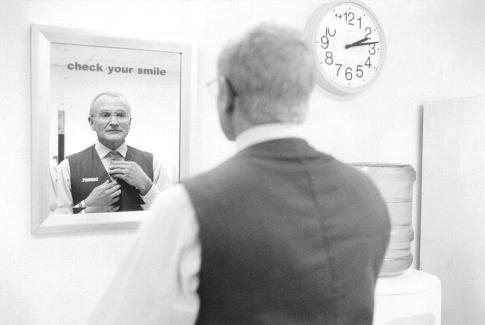I couldn’t stand to watch Robin Williams. I don’t mean this in the sniffy sense of an asshole contrarian saying “Eh, he was not so special” hours after a man’s death; he was so special—that’s the problem. His default manic-improv mode—which, as confirmed by myriad remembrances, tickled, pleased, and even uplifted millions—always made me recoil in horror and shame. The reason for this reaction was simple, and retroactively clear: Williams’s mania seemed to mask extreme, sustained, and infectious despair.
Perhaps “mask” isn’t even the right word. Some comics use the spotlight to exorcise their demons; Williams used his to feed them. Taken one at a time, his improvisational glissandos were often inspired, just as often clichéd, and increasingly hoary as time bore on: Schwarzenegger, a swishy gay guy, a “ghetto” “black” voice, a burst of Yiddish, a fifth-grade double entendre. (Just think what he would have done with the words “tickled, pleased, and uplifted” in the above paragraph.) What made these bits terrifying, at least to me, was the intensity of their aggregation. Taken together, they constituted more of a tic than a schtick, a curtain of compulsion that nearly obliterated the need to communicate as oneself, which the world proceeded to applaud. Of course, this switched-on, impressionistic style was mainstream at the time when Williams started out—Pryor’s, Midler’s, and Minnelli’s routines all use it—but no one took it as far and held on to it so tight as Williams did.
Norm Macdonald, one of my comedy heroes, tweeted a sweet encomium of Williams that’s accidentally illustrative of this. Decades ago, Macdonald was about to go on Letterman for the first time, and terrified to follow Williams; seeing this, Williams kindly stuck around to distract and console him for half an hour, apparently without saying a single word as Robin Williams. Instead, he did a Jewish tailor (complete with “which way do you dress?”) and a prolonged phone routine pretending to be a Chinese waiter. I feel pretty safe saying that, of the two men in the green room that night, the one more terrified was not Norm Macdonald.
Post-Aladdin, Robin Williams managed to relegate this persona from film to stage, voiceover, and promotional appearances (his late-night interviews, in particular, always seemed to build to him miming a giant penis). On the big screen, he gradually embraced a kind of twinkly-eyed, post-rehab mawkishness. It got him accolades, and an Oscar. Yet I still tensed up at it, waiting for the slip-up—a funny voice here, a quick impression there—the compulsion now mine as much as his. (I wonder if more viewers won’t feel the same now, the way one can no longer help zeroing in on premonitions of malady in Marty McFly’s twitchy charm in Back to the Future).
There are, however, three films in which I truly love Robin Williams: One Hour Photo, Insomnia, and The Secret Agent. In the first, an exercise in Kubrickian cool directed by Mark Romanek, he plays a pathologically timid store clerk obsessed with a customer. In the second, by Christopher Nolan, he is a serial killer tormenting Al Pacino’s weary detective against the glacial, glowing Alaskan backdrop. Finally, in Christopher Hampton’s take on Joseph Conrad, Williams puts in a short uncredited appearance as a man known simply as the Assassin. Williams’s preferred way of playing a villain was to underact so severely that he ended up willing himself into an almost perfect calm; it was captivating precisely because it went against his every celebrated instinct.
There’s that famous Godard quote about every fiction film also being a documentary of its actors; so it is here—these psychos, killers, and terrorists allowed Williams to stay quiet and still for the longest documented periods of time. (God only knows what desperate merriment followed the last take of his Secret Agent scene, played against Gerard Depardieu in the last throes of handsomeness—both men time bombs ticking louder than the one in the Assassin’s suitcase.) Finally seeing Williams in this eerie stasis—not riffing nor tearing up—felt downright therapeutic to me. I dare hope it made him feel better, too. The world will invariably remember the man’s great manic side. I will treasure the few moments I got to spend in the company of his silence.
